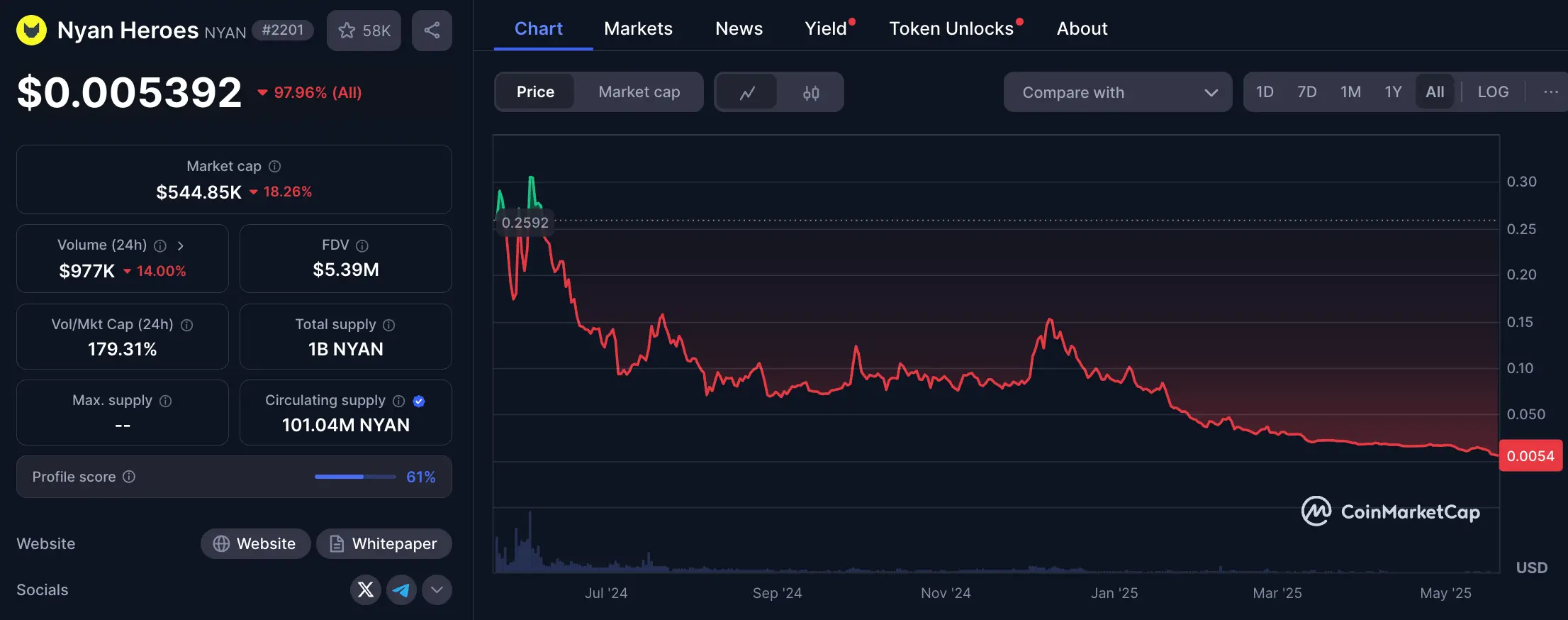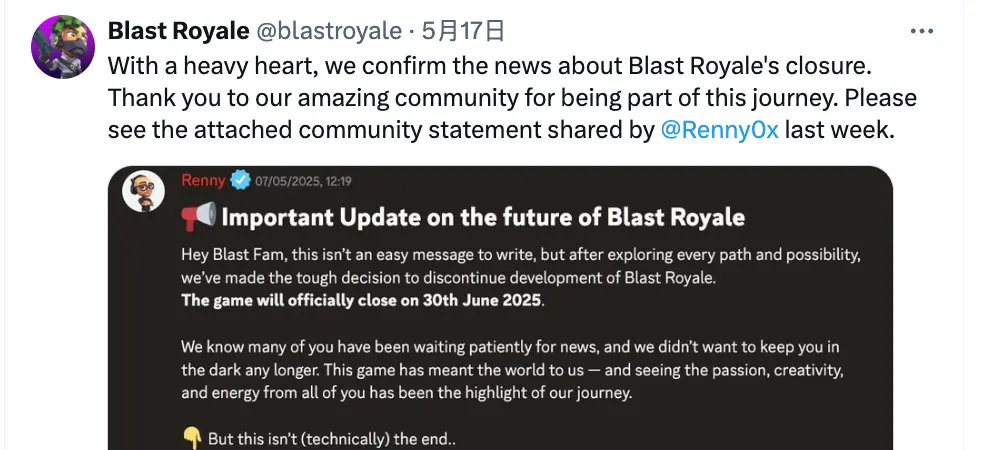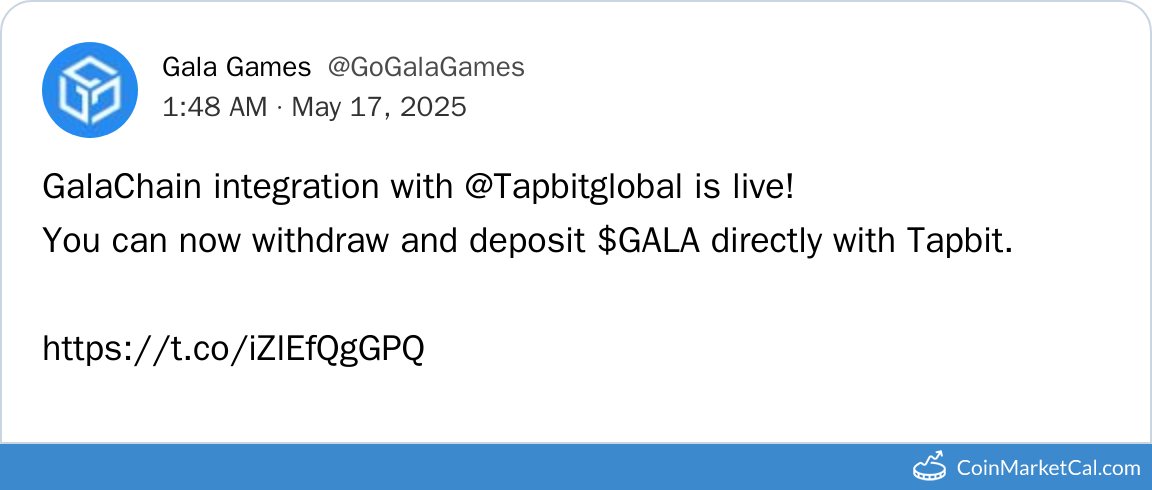Author: Deep Tide TechFlow
While the Meme Lauchpads are in full swing, some projects are becoming version outcasts.
For example, the chain game projects that were smash hits in the last cycle have recently ushered in a wave of outages.
On May 16, Nyan Heroes, the once star game project of the Solana ecosystem, announced that it was officially suspended due to a "lack of funds". Developer 9 Lives Interactive released a statement on the X platform, admitting that "it is not possible to get more money to complete the game".
In just one day, the NYAN token fell by as much as 37.2%, and then FDV fell to just around 5M, evaporating nearly 99% from its all-time high.
How lonely you are at the trough, how bright you are at the peak.
Recall that the game once attracted 1 million beta players and a Steam wishlist of 250,000; And today's market capitalization may not even be as good as a meme dog.
However, the fall of Nyan Heroes is not an isolated case. Recently, a number of blockchain game projects have announced the suspension of operations or the suspension of development, and the previous financing amounts ranged from millions to tens of millions of dollars, but all of them have come to an end.
The cyclical nature of the crypto industry is vividly reflected in the chain game. High financing with tailwinds, first-mover assets and then products, and headwinds gradually lie flat or even go to zero......
Some community commentaries joked that the decline of blockchain games is a "natural selection".
A group portrait of the boom and bust
Coincidentally, in 2025, Blast Royale, The Walking Dead: Empires, The Mystery Society and other chain game projects have announced the suspension or suspension of development one after another.
These projects, which once attracted a lot of attention with high financing and P2E (Play-to-Earn) models, have gone from booming to gloomy in just a few years.
Nyan Heroes: The bubble of cat heroes bursts
This was indeed the star project of the Solana ecosystem, with a cumulative funding of $13 million with the idea of a cat-themed hero shooter, including a $2.5 million seed round in November 2021, a $7.5 million Series A in May 2022 (valued at $100 million), and a $3 million add-on round in March 2024.
Playtests have attracted 1 million players (official figures), Steam and Epic Games Store wishlists have reached 250,000, and the NYAN token launch in May 2024 has boosted market enthusiasm. However, on May 16, 2025, developer 9 Lives Interactive announced that it would halt development due to "inability to obtain more funding".
Blast Royale: The dismal exit of the Battle King
Blast Royale is a Polygon-based mobile battle royale (Battle Royale Survival) game featuring 6 minutes of fast-paced battles and P2E mechanics. In April 2022, the project raised $5 million through an ICO, with investors including Dragonfly Capital and Mechanism Capital.
The game appealed to early players with its lightweight gameplay, but never managed to make a breakthrough on a large scale. In May 2025, developer First Light Games announced that it had decided to terminate development due to an "internal review", and plans to officially suspend operations on June 30.
The Walking Dead: Empires: IP aura isn't easy to use either
Developed by Ember Entertainment and published by Gala Games, it is a survival MMORPG based on the IP of the well-known American drama "The Walking Dead", and integrates NFT ownership mechanisms.
Although the specific financing amount of the project has not been disclosed, relying on Gala Games' financial support and IP advantages, it has been open for testing for more than a year, attracting fans to build bases and participate in battles. However, in May 2025, Gala Games announced that it would terminate the project on July 31 due to "comprehensive considerations".
The Mystery Societ: The mystery game is a flash in the pan
Created by the former Disney and Club Penguin team, it focuses on Web3 social reasoning gameplay, and received a $3 million seed round in September 2024, led by Shima Capital. The project has been well received for its community-driven and innovative mechanics, attracting active players to participate in early testing. However, on February 25, 2025, developer Great Big Beautiful Tomorrow announced a suspension of development due to "industry challenges and lack of funding".
We have also made a table summarizing the above chain games that have announced that they will cease operations or stop development.
It can be seen that these games basically raised a decent amount of money in the last cycle, and invariably used the mechanism of combining NFT and token assets with the in-game mechanics for consumption.
Well-known VCs are investing in a lot of money, but it is still difficult to accept the reality of failure.
Underneath the surface, player churn, P2E model imbalance, and misaligned assets and development priorities are the real drivers. They advertise high fundraising and big visions, but rarely deliver playable products.
And some things are also a tacit industry tacit understanding: the product itself is not the point, and no one really wants to play these games. A track that fights for creativity and content density, and encounters the hairy customers who fight for physical strength and money, and the results can be imagined.
Boom and bust, boom in financing, decline in gameplay.
Genes determine destiny
As you may have noticed, the irony is that the reason for the suspension of these blockchain games is --- "lack of funds".
Almost all of the discontinued chain game projects will officially announce that they are not doing it because of lack of funds, and it is difficult to create a high-quality game.
Are these blockchain games really short of money? From the point of view of pure games, there may be no shortage.
For example, the $13 million raised by Nyan Heros, let's ignore the game, what is the concept of $13 million?
Not to mention the top 3A, take the domestic light, the seventh-generation work of the top stand-alone game IP "The Legend of Sword and Fairy", according to public reports, its development cost is 67 million yuan. In other words, all the financing funds of Nyan Heros are used to make games, and it is more than enough to seriously do a fairy sword.
And the overseas case is even more alarming.
Stardew Valley, a well-known play-up game that took solo developer Eric Barone four years to build with only about $50,000, has sold more than 30 million copies worldwide since its launch in 2016, making it an indie legend.
The graphics of this game are not much different from some game projects that have raised more than one million.
This also shows that the game is a product that pays great attention to creative quality and content density, and 1 person, 50,000 US dollars, can also win by creativity and gameplay.
Compared with the chain games, they have responded to the "lack of funds" to suspend development, and the contrast is very obvious--- Funds will be insufficient at any time, especially if you don't want to use the funds to develop games.
The genes of chain games have determined that it cannot make games in the direction of high quality and slow work in the traditional game industry; It is more like a resource bureau and a capital disk, which needs to design appropriate operating rhythms and investment rules to meet the needs of various primary and secondary investors.
Financing first and doing things later has become the optimal solution for this track, as for whether it can be done or not, that is a later story.
Looking at the success of traditional games, it is better to do things first and then raise funds.
For example, "Black Myth: Wukong", in 2020, only a few scenes were developed and designed, and after releasing trial clips to amaze players with quality and prove their potential, they received more follow-up financing.
And "Genshin Impact", "Ming Tide" and other new domestic second game forces, also take a phased development of gradual iteration of the method, each version tries to present new plots and characters, players feel immersed and pay for the role, slowly accumulate funds, develop more versions and works.
These games are content-centric, with story, art, and mechanics accounting for the majority, and financing is an aid rather than an end. Web3 and traditional gaming are almost opposites, and the speculative gene runs throughout:
The player is the investor, and the game is the Ponzi – and the patience and ingenuity required for the game are incompatible. The track itself is not hopeless, but the "finance first, play later" model is a dead end.
The boom and fall of blockchain games is actually the inevitable result of the misalignment of industry genes and user needs. Capital and concepts can generate popularity in the short term, but they cannot support a truly viable game ecology in the long term.
When more and more games are falsified, it is worth looking forward to after the suspension of the tide.
Show original


















































Socials